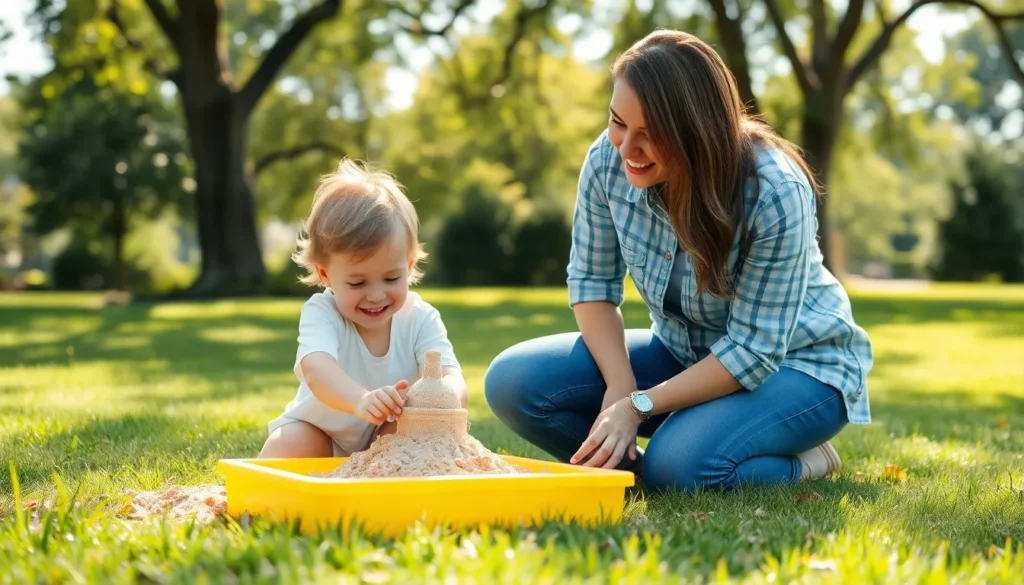Raising kids isn’t just a job; it’s an adventure filled with unexpected twists and turns. Picture this: one moment, you’re a superhero solving the mystery of the missing sock, and the next, you’re negotiating peace treaties over snack time. Successful child raising requires a blend of patience, creativity, and maybe a dash of caffeine.
Table of Contents
ToggleUnderstanding Successful Child Raising
Successful child raising requires awareness of key developmental factors. Understanding these components enables caregivers to foster a supportive environment for children.
The Importance of Early Development
Early development plays a crucial role in shaping a child’s future. Research indicates that 90% of brain growth occurs before age five. Parents influence social skills, emotional stability, and cognitive abilities during this critical period. Engaging children in interactive play, reading on a daily basis, and providing a variety of experiences significantly enhances their learning potential. Consistency in routines also supports secure attachment and builds a solid foundation for future relationships.
Defining Success in Parenting
Defining success in parenting varies among families. Success often includes nurturing happy, healthy, and well-adjusted individuals. Fostering independence and resilience ranks high in many parents’ goals. Setting realistic expectations alongside providing unconditional love and support defines a positive parenting experience. Encouraging open communication helps children develop confidence and self-esteem. Ultimately, successful parenting encompasses understanding, adapting, and responding to each child’s unique needs.
Key Principles of Successful Child Raising

Successful child raising involves nurturing emotional bonds and fostering independence. Understanding these principles helps parents raise well-adjusted individuals.
Building a Strong Emotional Connection
Establishing a strong emotional connection is vital. Responsive interactions during play and conversation help build trust. Engaging in daily routines creates security and belonging. Parents can express affection through words or gestures, reinforcing love and support. Listening actively encourages open communication, allowing children to share their feelings. Recognizing and validating emotions contributes immensely to emotional growth. Consistent availability strengthens the attachment between parent and child, creating a safe space for exploration.
Encouraging Independence and Autonomy
Fostering independence is key for healthy development. Allowing children to make choices encourages critical thinking. Parents can provide opportunities for decision-making in daily activities, fostering a sense of responsibility. Setting age-appropriate tasks cultivates confidence. Encouraging exploration and problem-solving strengthens autonomy. Providing guidance without micromanaging gives children room to learn from mistakes. Supporting their interests and talents promotes individuality, allowing them to thrive. Giving praise for efforts, whether successful or not, nurtures resilience.
Effective Communication Strategies
Effective communication lays the groundwork for a solid parent-child relationship. Parents can employ various strategies to enhance understanding and foster a trusting environment.
Active Listening Techniques
Active listening improves clarity and connection. Parents can focus on their child’s words and emotions, validating what they express. Making eye contact and nodding shows engagement. Repeating back what a child says encourages mutual understanding. Responding with empathy enhances emotional support, making children feel valued. Encouraging them to share thoughts helps develop their communication skills while building confidence. These techniques create an environment open to dialogue, ensuring children’s voices feel heard.
Setting Clear Expectations
Setting clear expectations guides children in understanding behavioral norms. Parents can articulate rules and boundaries simply and directly. Using consistent language allows children to grasp what’s required of them. Discussing the reasons behind expectations promotes comprehension and cooperation. Reinforcement through praise when children follow guidelines supports positive behavior. Offering age-appropriate choices within those boundaries fosters both autonomy and accountability. Consequently, this structured approach helps children learn responsibility, making them feel secure and empowered in their decision-making.
The Role of Discipline in Child Raising
Discipline plays a crucial role in shaping children’s behavior and character. It encompasses more than just punishment, focusing on teaching and guiding children toward positive decisions.
Positive Reinforcement Approaches
Positive reinforcement encourages desired behavior through rewards and praise. By acknowledging achievements, parents motivate children to repeat positive actions. For example, when a child shares toys, verbal praise strengthens that behavior. Incorporating small rewards, like stickers or extra playtime, also reinforces good behavior. Parents can create environments rich in encouragement and support, fostering a sense of accomplishment. This technique not only builds self-esteem but also establishes a trusting relationship between parent and child.
Establishing Consistent Boundaries
Consistent boundaries provide children with a sense of security and stability. Clear rules help them understand expectations, which aids in decision-making. For instance, a set bedtime reinforces the importance of routine. Parents should communicate these boundaries openly, explaining the reasons behind each rule. This transparency fosters comprehension and compliance. Regularly revisiting and reinforcing boundaries ensures children adapt as they grow. Utilizing logical consequences for rule-breaking instead of harsh punishment cultivates a learning environment where children recognize the impact of their actions.
Raising children is a rewarding yet challenging endeavor that requires dedication and adaptability. By fostering strong emotional connections and encouraging independence parents can create a nurturing environment that promotes growth and resilience. Effective communication plays a pivotal role in building trust and understanding between parents and children.
Implementing positive reinforcement and setting clear expectations helps children navigate their world with confidence. Ultimately the journey of parenting is about balancing guidance with freedom allowing children to flourish into well-rounded individuals. With love patience and a commitment to their unique needs parents can successfully guide their children toward a bright future.





